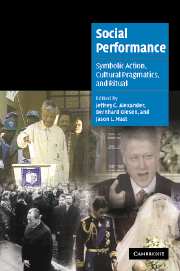Book contents
- Frontmatter
- Contents
- List of figures
- List of tables
- List of contributors
- Introduction: symbolic action in theory and practice: the cultural pragmatics of symbolic action
- 1 Cultural pragmatics: social performance between ritual and strategy
- 2 From the depths of despair: performance, counterperformance, and “September 11”
- 3 The cultural pragmatics of event-ness: the Clinton / Lewinsky affair
- 4 Social dramas, shipwrecks, and cockfights: conflict and complicity in social performance
- 5 Performing a “new” nation: the role of the TRC in South Africa
- 6 Performing opposition or, how social movements move
- 7 Politics as theatre: an alternative view of the rationalities of power
- 8 Symbols in action: Willy Brandt's kneefall at the Warsaw Memorial
- 9 The promise of performance and the problem of order
- 10 Performance art
- 11 Performing the sacred: a Durkheimian perspective on the performative turn in the social sciences
- Index
- Cambridge Cultural Social Studies
- References
9 - The promise of performance and the problem of order
Published online by Cambridge University Press: 07 December 2009
- Frontmatter
- Contents
- List of figures
- List of tables
- List of contributors
- Introduction: symbolic action in theory and practice: the cultural pragmatics of symbolic action
- 1 Cultural pragmatics: social performance between ritual and strategy
- 2 From the depths of despair: performance, counterperformance, and “September 11”
- 3 The cultural pragmatics of event-ness: the Clinton / Lewinsky affair
- 4 Social dramas, shipwrecks, and cockfights: conflict and complicity in social performance
- 5 Performing a “new” nation: the role of the TRC in South Africa
- 6 Performing opposition or, how social movements move
- 7 Politics as theatre: an alternative view of the rationalities of power
- 8 Symbols in action: Willy Brandt's kneefall at the Warsaw Memorial
- 9 The promise of performance and the problem of order
- 10 Performance art
- 11 Performing the sacred: a Durkheimian perspective on the performative turn in the social sciences
- Index
- Cambridge Cultural Social Studies
- References
Summary
Introduction
The purpose of this chapter is partly historical, partly conceptual. It is an attempt to articulate the performative element implied by the metaphor of the social contract, a metaphor that served as one of the basic social paradigms in early modern and Enlightenment social thought and only a generation ago began to enjoy a revival mainly due to John Rawls' Theory of Justice and, to a lesser extent, the wintrier Calculus of Consent by Buchanan and Tullock. Though almost all of today's contractarians have taken to heart David Hume's early critique of the idea of an original contract (Hume 1948), I do not think that the exchange of promises or some equivalent performance that Hobbes and others deemed necessary for establishing a commonwealth is merely a theoretical chimera. Indeed, the particular type of consent that the earlier social contract theorists assumed people showed to their government has, as we hope to show, a strong performative element to it that deserves further theoretical attention. In particular, if sociologists with an interest in performance were to examine Hobbes' way of framing the contractual institution of a sovereign they would discover a nice interlocking of concerns relating both to problems of social fusion and the staging of collective representations (see the contributions of Alexander and Giesen in the present volume). Our reading of Hobbes will add a certain performative twist to the contractarian paradigm and will enable us to reframe some of its seemingly sterile or misplaced idealizations as the dramatic effects necessary for its successful discursive implementation.
- Type
- Chapter
- Information
- Social PerformanceSymbolic Action, Cultural Pragmatics, and Ritual, pp. 283 - 314Publisher: Cambridge University PressPrint publication year: 2006
References
- 6
- Cited by



